

The Virgin Suicides. Lecture 20 - The Classical Feminist Tradition. 2 Literary Criticism. Good literary criticism can be one of the hardest kinds of information to find on the Internet.
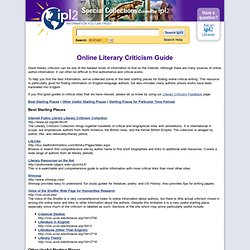
Although there are many sources of online author information, it can often be difficult to find authoritative and critical works. To help you find the best information, we've collected some of the best starting places for finding online critical writing. This resource is particularly good for finding information on English-language authors, but also includes many authors whose works have been translated into English. If you find good guides to critical sites that we have missed, please let us know by using our Literary Criticism Feedback page. Best Starting Places | Other Useful Starting Places | Starting Places for Particular Time Periods Best Starting Places Internet Public Library Literary Criticism Collection The Literary Criticism Collection brings together hundreds of critical and biographical sites with annotations. Other Useful Starting Places. Gender and the Body Language of Power. We’re celebrating the end of the year with our most popular posts from 2013, plus a few of our favorites tossed in.
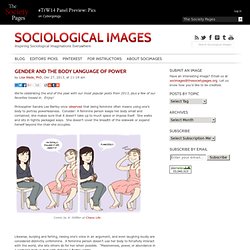
Enjoy! Philosopher Sandra Lee Bartky once observed that being feminine often means using one’s body to portray powerlessness. Consider: A feminine person keeps her body small and contained; she makes sure that it doesn’t take up to much space or impose itself. Lecture 20 - The Classical Feminist Tradition. Syllabus for the Course: Feminist Theory. Syllabi for Women & Gender-Related Courses in Anthropology. Women in Lit Links.
English Literature in Context. '... a brilliantly designed textbook, thoughtfully conceived and appealingly presented, clearly showing how literature is vibrantly alive in and to the world in which it was written.
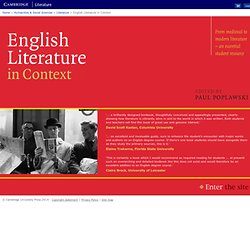
Both students and teachers will find this book of great use and genuine interest.' David Scott Kastan, Columbia University '... an excellent and invaluable guide, sure to enhance the student’s encounter with major works and authors on an English degree course. If there’s one book students should have alongside them as they study the primary sources, this is it.' Elaine Treharne, Florida State University 'This is certainly a book which I would recommend as required reading for students ... at present such an overarching and detailed textbook like this does not exist and would therefore be an excellent addition to an English degree course.' 'Female Freedom Has an Expiration Date' - Being 35 and Single. Women Working - , 1800–1930. Schlesinger Library. Judy Chicago: Through the Archives. Judy Chicago: Through the Archives opens on February 26, 2014, and runs through September 30, 2014.
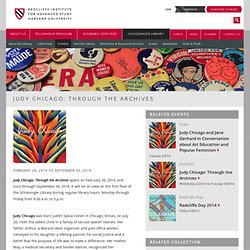
It will be on view on the first floor of the Schlesinger Library during regular library hours: Monday through Friday from 9:30 a.m. to 5 p.m. Judy Chicago was born Judith Sylvia Cohen in Chicago, Illinois, on July 20, 1939, the oldest child in a family of secular Jewish liberals. Her father, Arthur, a Marxist labor organizer and post office worker, conveyed to his daughter a lifelong passion for social justice and a belief that the purpose of life was to make a difference. Her mother, May, a medical secretary and former dancer, recognized her daughter’s abilities and enrolled her at an early age in classes at the Art Institute of Chicago.
Portraits of American Women Writers: Gallery. African American Women Writers of the 19th Century. Gender and Women's Studies. Images of Women in Literature Syllabus. Women In Literature Syllabus. English 3340.01/Thursday 6-8:40/ SUA 102D/Dr.
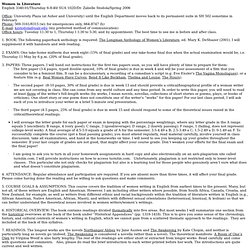
Zabelle Stodola/Spring 2006 Office: University Plaza (at Asher and University) until the English Department moves back to its permanent suite in SH 502 sometime in February Phone: 569-3161/8315 (w); for emergencies only, 664-8747 (h) E-mail: kzstodola@ualr.edu (my preferred method of communication) Office hours: Tuesday 11:30 to 1, Thursday I 1:30 to 5:30, and by appointment. 1. Resources in American literature and culture (non-frames version) Teachingliterature / (Representations) Women in literature. Why should we study women and literature?
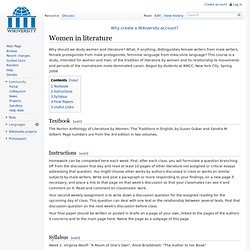
What, if anything, distinguishes female writers from male writers, female protagonists from male protagonists, feminine language from masculine language? Women in the Nineteenth Century. Text only Women in the Nineteenth Century It was an age where the impact of the industrial revolution caused a sharp differentiation between the gender roles, especially of the upper and middle classes.
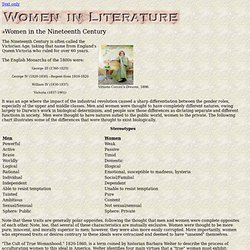
Men and women were thought to have completely different natures, owing largely to Darwin's work in biological determinism, and people saw those differences as dictating separate and different functions in society. Men were thought to have natures suited to the public world, women to the private. The New Woman Fiction. Introduction.
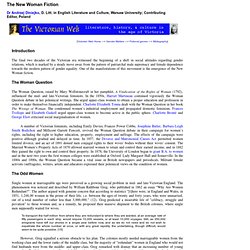
Coventry Patmore's Daring Subject — Marriage. Lthough Coventry Patmore's The Angel in the House had many Victorian admirers, most twentieth-century commentators criticize the poem for its supposedly tame subject, marriage, or treat it solely as an influentual text that idealized women as domestic goddesses — and hence, in some way, represents (or even caused) Victorian England's limitation of women to the domestic sphere.
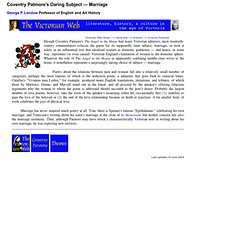
Chapter Eight: Century's End: "The Coming Universal Wish Not to Live. Ccording to William Knighton, whose essay on suicide appeared in the 1881 Contemporary Review, "Men everywhere are becoming more weary of the burden of life" (82).
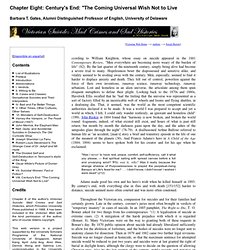
By the last quarter of the nineteenth century, simply being alive had become a severe trial to many. Hopelessness beset the dispossessed and sensitive alike, and vitality seemed to be eroding away with the century. Men, especially, seemed to find it harder to displace anxiety and death. Gender, desire, and power in 19th century French culture. Project MUSE - "They Prefer Withdrawal": The Choice of Birth Control in Britain, 1918-1950. Bedford/St. Martin's: The House of Mirth First Edition by Edith Wharton, Edited by Shari Benstock.
The Queens Looking Glass (Gilbert and Gubar) And the lady of the house was seen only as she appeared in each room, according to the nature of the lord of the room. None saw the whole of her, none but herself. For the light which she was was both her mirror and her body. None could tell the whole of her, none but herself. —Laura Riding Alas! As to all that nonsense Henry and Larry talked about, the necessity of "I am God" in order to create (I suppose they mean "I am God, I am not a woman"). . . . this "I am God," which makes creation an act of solitude and pride, this image of God alone making sky, earth, sea, it is this image which has confused woman. A few thoughts on Woolf’s androgynous mind. Hi all, it’s Emily from Evening All Afternoon. A big thanks to this month’s host Ana and the rest of the fine ladies here at Year of Feminist Classics for letting me guest-post! I love this project almost as much as I adore Virginia Woolf, so it seemed natural to spend a little time here writing about one of my favorite passages from A Room of One’s Own.
Hope you enjoy! Woolf’s Androgynous Mind. Annette Kolodny – “Dancing Through the Minefield” Annette Kolodny, “Dancing Through the Minefield: Some Observations on the Theory, Practice, and Politics of a Feminist Literary Criticism,” in E. Showalter, ed. New Feminist Criticism (1980), pp. 144-5; 159-63 I was quite taken with this excerpt from Kolodny. She is a careful thinker committed to both “intellectual honesty [and] hard-won insights,” both of which she displays in spades in her writing. I find it difficult to create a summary of this excerpt; I found so much that was enjoyable and noteworthy in it that I fear my summary may be longer than the excerpt itself. “Courtly Love, Or, Woman As Thing”: How To Do Lacanian Analysis Like Slavoj Zizek (Or, At Least Understand What He’s Getting At When He Does) In his essay, “Courtly Love, or, Woman as Thing” (1994) cultural critic Slavoj Zizek (b. 1949) presents courtly love—knight-Lady romance as ritualized in the European Middle Ages—through a Lacanian lens (Jacques Lacan, the psychoanalyst popularly dubbed the “French Freud”).
Courtly love, on Zizek’s reading, is representative of our existential problem as such. The reality, according to him (and, always by extension, Lacan), is that we are in the midst of a universe that simply is not comprehensible to us: it neither answers to our most narcissistic desires (such as to live forever without suffering) nor makes sense when we press our questions beyond a certain point. For example, “What kind of universe is this, that the Holocaust happened in it?” When we ask such a question, neither God nor the universe speaks; they are mute; their radical otherness resists comprehension. Woman is one of the Names-of-the Father. The usual way of misreading Lacan's formulas of sexuation 1 is to reduce the difference of the masculine and the feminine side to the two formulas that define the masculine position, as if masculine is the universal phallic function and feminine the exception, the excess, the surplus that eludes the grasp of the phallic function.
Such a reading completely misses Lacan's point, which is that this very position of the Woman as exception-say, in the guise of the Lady in courtly love-is a masculine fantasy par excellence. As the exemplary case of the exception constitutive of the phallic function, one usually mentions the fantasmatic, obscene figure of the primordial father-jouisseur who was not encumbered by any prohibition and was as such able fully to enjoy all women. Does, however, the figure of the Lady in courtly love not fully fit these determinations of the primordial father? In this precise sense, Woman is one of the names-of-the-father. Notes 11 G.W.F. Literary Interpretation: Virginia Woolf's Shakespeare. Virginia Woolf. From Modernism Lab Essays Wiki Articles. Virginia Woolf – Mrs. Dalloway (Part 1) She would buy the flowers herself. For Lucy had her work cut out for her.
Mrs Dalloway. » Mapping Mrs. Dalloway Introduction to Digital Humanities. Anne Finch, Countess of Winchilsea. Anne Finch, Countess of Winchilsea. Biography: Anne Kingsmill Finch is significant as one of the earliest published women poets in England. {1} She is also delightful! Female Tradition as Feminist Innovation by Annie Finch. Introduction. A Teacher and Her Student: Marilynne Robinson. Lessing, Doris : The Fifth Child. George R. R. Martin on writing women. Why D.H. Lawrence, Misogynist Male Author, Has Lots of Female Fans - Noah Berlatsky. English Literature Author: Zora Neale Hurston. Zora Neale Hurston 1891-1960 American. Apprchs to Teaching Z N Hurston (MLA) table of contents. "George Eliot" by Virginia Woolf.
The Awakening.